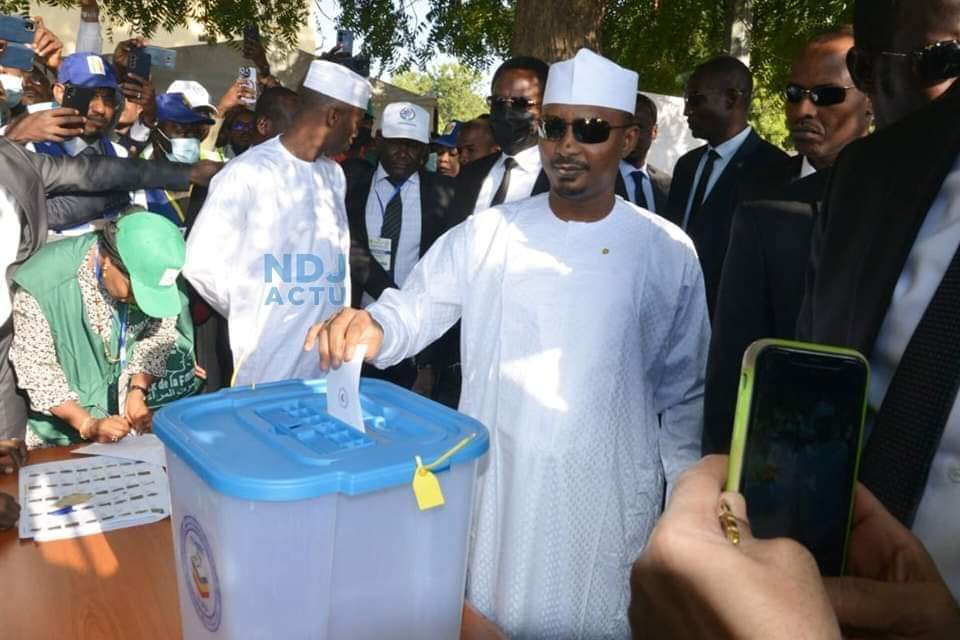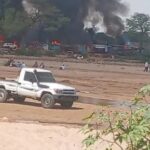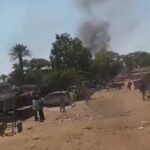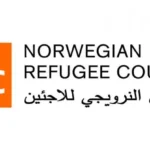Darfur follow-up
French army base In Abéché, a city in eastern Chad, Mohamed Adam waits for his two young children. He says they have spots on their faces, so he takes them to the French base. “If you are sick sometimes they help you.” Mr. Adam, a taxi driver, is grateful. But even he questions France’s role in Chad. “We are not completely independent,” he says. “50% for us and 50% for France.” But he demurred when asked whether all French troops should leave. Many others in Abéché are more hostile. Last year, demonstrators tried to storm the base, tore down the French flag and replaced it with the Chadian flag.
Anti-French sentiment has increased sharply in the Sahel region, the arid sector south of the Sahara, after the failure of the long French military intervention to stop jihadist violence in Mali, Niger and Burkina Faso. The death toll in the conflict has increased from about 800 in 2016 to nearly 6,000 in 2021, the last full year of French operations in Mali.
A wave of coups has swept the region since 2020, hitting Mali, Burkina Faso and Niger. Those who attacked them tried to justify their actions as necessary for security. Each of them was made a scapegoat by France to boost his popularity on the street. The French soldiers, who had been invited to participate, were quickly expelled, although this did not improve the security situation. France’s operations in those countries are headquartered at a permanent base in the capital of Chad, N’Djamena, which has long been its closest ally in the region. Large convoys of the French army withdrawing from Niger are now arriving in the city.
However, many worry that France may be expelled from Chad as well. Recent opinion polls show declining support for France and rising popularity for Russia, says a Western official. Others fear that the tension and political threats on Chad’s borders could turn into civil war. “It’s a powder keg that’s going to explode,” says Cameron Hudson of the Center for Strategic and International Studies, a think tank in Washington.
This would constitute a geopolitical nightmare because Chad represents a dividing point between several conflagrations in the region: civil war and genocide in Sudan; jihadist violence in the Sahel region; And strife in the Central African Republic and Libya, where Russian Wagner Group mercenaries are active in both countries.
Mohamed Idriss Déby has been running Chad since April 2021, when his father, Idriss Déby, was killed on the battlefield by rebels. The older man had seized power in an armed rebellion in 1990. It did not bother France that his son’s seizure of power was unconstitutional. Its president, Emmanuel Macron, quickly flew to the funeral and publicly confirmed that France would intervene to stop future rebel attacks. His country has long supported Chad’s dictators in exchange for Chadian soldiers fighting alongside France in the region and French bases in the country.
This support extended to include French aircraft bombing rebel columns. In 2019, they crushed a rebel advance. It is understood that in 2021 France provided intelligence on rebel movements and carried out threatening air flights, but was not directly asked by Chad’s rulers to strike.
The younger Déby initially promised an 18-month transitional period to hold the elections, and that he would not run in the elections. However, in October 2022, he extended the transition period for another two years and announced that he was eligible to run after all. Angry opposition groups took to the streets. Chadian security forces killed at least 128 people in one day and detained hundreds more.
It is now scheduled to hold a constitutional referendum, which began yesterday amid widespread opposition campaigns rejecting this referendum, which paves the way for holding elections late next year. However, it is highly unlikely that Déby will lose the election. The main opposition leader, Soussis Massra, who left Chad after last year’s bloodshed and was pursued by the regime with an international arrest warrant, returned in early November after signing an agreement with Deby’s government.
Many fear that Mr. Masra, short of funds and little support in Washington or Paris, has been handpicked by the regime, perhaps with the promise of a government position. “When Nelson Mandela signed an agreement with the apartheid regime, did that mean Mandela was chosen?” says Mr. Massra when this claim is brought to him, adding that it is a “pro-democracy agreement.” However, few expect free elections. A palace coup may pose a greater threat to Déby than the ballot box. The president was not the unanimous choice to take power when his father died. The ruling clique in Chad belongs to the Zaghawa tribe in the east, which constitutes only a small percentage of Chad’s population. However, Mr. Deby’s mother is not Zaghawa, which causes some tension. His half-brothers almost certainly have their own presidential aspirations.
He also sparked anger when he dismissed a large number of generals. Although officially neutral in Sudan’s civil war, Deby implicitly supported the RSF, and allowed the United Arab Emirates to airlift weapons to the group via an airport in Am Grasse, the birthplace of Deby’s family.
At the same time, it is clear that the UAE, which maintains that the flights carry humanitarian aid and not weapons, has provided a significant amount of financial support to Mr. Deby’s government. Which increased the limits of Sudanese-Chadian relations following Yasser Al-Atta’s statements about the Sudanese army and the summoning of the Sudanese ambassador to N’Djamena.
He requested an apology from the Sudanese government for Al-Atta’s statements within 72 hours. However, the Sudanese Foreign Ministry, in a statement, refused to apologise, and in a shocking response from the Chadian Foreign Ministry, the Sudanese ambassador was summoned and told to expel him.
Diplomatic staff The Sudanese from N’Djamena were given 72 hours to leave the country. This step coincided with the fierce attacks launched by the Rapid Support Forces on Gezira State and some areas in Khartoum State and North Darfur.
This morning, the Sudanese Foreign Ministry responded to the Chadian government by expelling 4 diplomats from Sudan. This step will complicate the scene, especially the Sudanese, Chadian and Emirati relations, with the well-known role that the Emirates continues to play in empowering Dubai for the coming and long periods of rule. .
However, many members of Chad’s ruling elite have close family and tribal ties to Zaghawa rebel groups in Sudan’s Darfur region. In mid-November, the most powerful of them declared war on the Rapid Support Forces. This would exacerbate tensions within the Zaghawa ruling circles in N’Djamena. “[Support for the RSF] threatens to divide the family and divide the army,” says a Western diplomat.
“I don’t think Debbie’s leadership will last a year,” Hudson says. Not everyone is so sure. He faces many threats, but is proving to be a surprisingly skilled political player, says Enrica Pico of the International Crisis Group, a Brussels-based think tank.
A palace coup does not necessarily mean civil war or forcing the French to leave, although it may increase the risk of either. A military coup by non-Zaghawa officers would likely lead to widespread bloodshed and the expulsion of the French. Ms. Biko points out that some Arabs, even within the ruling coalition, are dissatisfied with Mr. Déby’s leadership.
It is also possible that rebels could invade the country from outside to oust Deby. It was rebels from Libya who killed his father in 2021, while leaked US intelligence cables earlier this year suggested that Wagner mercenaries were aiding southern Chadian rebels in another plot to oust Mr Déby.
Such threats may explain why Mr. Déby is looking for new ways to consolidate his power. In November, the Hungarian Parliament approved the deployment of up to 200 soldiers in Chad, ostensibly to combat terrorism and illegal migration. Some analysts suspect that this deployment is actually intended to help Deby secure the gold fields in the troubled north or perhaps even to protect it from a coup.
The agreement with Khalifa Haftar, the warlord who controls eastern Libya, recently led Haftar’s men to launch attacks on Chadian rebel bases in Libya. Deby also enjoys warm relations with Macron, whom he recently visited in Paris. This relationship, combined with Chad’s status as France’s last ally in a vast and volatile region, suggests that France may use air power again against columns of rebels attacking from Libya.
To the south of Chad, despite Wagner’s alleged machinations, Déby appears to have fostered surprisingly good relations with Faustin Archange Touadera, the Central African president, who agreed to allow Chadian forces to pursue the rebels into his country.
Another worry for Deby is the potential for backlash from Sudan’s civil war, which is already giving him a headache. However, the end of the war in Sudan could bring more problems. Many RSF fighters have ties to Chad and have axes to grind, despite Déby’s recent tacit support. If the RSF defeats the official Sudanese army, some of its men may try to settle scores in Chad.
They will almost certainly pursue refugees or fighters who have fled across the border. However, if the RSF loses, large numbers of armed fighters may flow into Chad. They may head directly to N’Djamena to seize power.
Western governments have turned a blind eye to Deby’s bloody authoritarianism, just as they did to his father’s, because they fear that the collapse of the regime will lead to civil war or a pro-Russian regime.
After defeat in Niger and Mali, France believes that pushing Deby to fulfill his promise not to run and hold free elections is “a luxury we cannot afford,” says a Western diplomat. This position frustrates Mr. Massra, who says that France and the United States of America have only viewed Chad as useful for security.
What about the expectations of our people?








